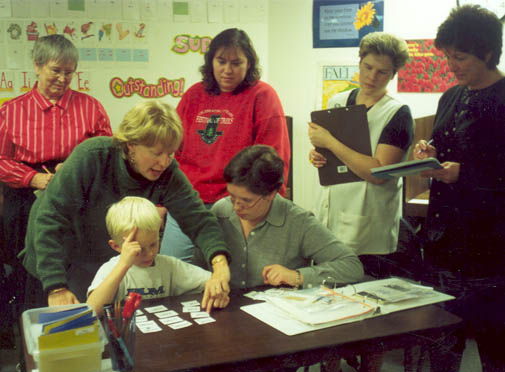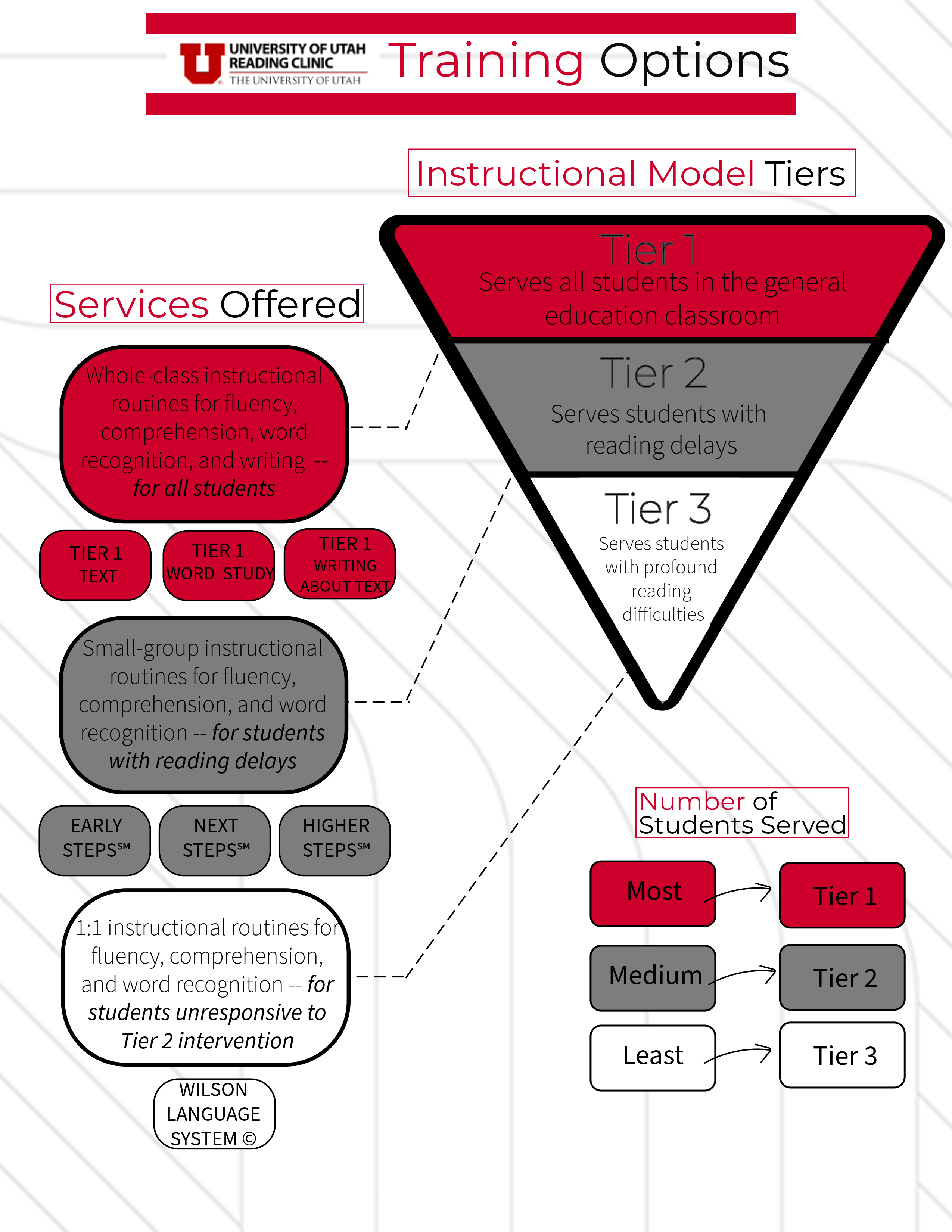Professional Development

The "flagship" of UURC professional development for educators is the clinical practicum. Clinical practica allow educators to receive intensive coaching as they deliver intervention to struggling readers over an extended period of time.
Educators are no doubt united in their hope that every child they teach learns to read. However, research suggests that the knowledge that educators need to be effective, efficient reading teachers is complex, and may not be well-covered by university programs (Foorman & Moats, 2004; NCTQ, 2006; Snow, Griffin, & Burns, 2006; Spear-Swerling & Brucker, 2004; ). These findings are corroborated by studies of knowledge gaps on the part of practicing teachers with relation to integral instructional areas such as phonological awareness, word recognition development, and vocabulary learning (Broaddus & Bloodgood, 1999; Moats, 1999).
Practica are designed to help educators:
- build subject matter knowledge about reading development, instruction, and intervention,
- become effective & efficient at delivering Tier I instruction so that all G2+ readers improve fluency and comprehension,
- improve their instructional practices in core components: assisted reading, phonics, fluency, comprehension/vocabulary, and curriculum-based assessment,
- develop a "team approach" to reading intervention utilizing whole class, as well as, tutorial and small groups for English Language Learners, children of poverty, and/or students with low academic achievement,
- ensure that readers make adequate, measurable yearly progress, and,
- institutionalize an infrastructure that will sustain efforts after the practicum is over.
Educators will be interested to know, that, in every Utah school where the UURC has conducted an initial clinical practicum, educators have requested a second, third, and in most instances, a fourth year of training - clear evidence that participants attach high value to the experience.

UURC Practicum Logistics for Educators
As many as 12, and no fewer than 10 educators participate in a UURC practicum, on-site in a Utah school for an entire school year. Candidates may include classroom teachers, special educators, paraprofessionals and/or administrators.
During a year-long Early StepsSM/Early StepsSM Quads practicum, participating educators will:
- Develop and maintain (in a binder) at least 85 Early Steps (ES or ESQ) lesson plans.
- Tutor at least 1 student 2-3 times per week for at least 85 lessons (1:1 format = 30 minutes; small group = 45 minutes).
- Collect pre, post, and ongoing data for student(s).
- Participate in 9 half-day clinical training sessions with a practicum leader.
- Be observed during implementation by practicum support staff 6 times.
- Earn "satisfactory scores" on 2 observations, 1 of which must be on final observation.
- Complete observation forms on 2 self-observation videos and submit forms to liaison.
- Attend 5 hour-long research seminars
During a year-long Next StepsSM/Next StepsSM Triads practicum, participating educators will:
- Develop and maintain (in a binder) at least 45 Next Steps (NS or NST) lesson plans.
- Tutor at least 1 student 2-3 times per week for at least 45, 45-minute lessons.
- Collect pre, post, and ongoing data for student(s).
- Participate in 9 half-day clinical training sessions with a practicum leader.
- Be observed during implementation by practicum support staff 6 times.
- Earn "satisfactory scores" on 2 observations, 1 of which must be on final observation.
- Complete observation forms on 2 self-observation videos and submit forms to liaison.
- Attend 5 hour-long research seminars.
During a year-long Higher StepsSM/Higher StepsSM Triads practicum, participating educators will:
- Develop and maintain (in a binder) at least 45 Higher Steps (HS or HST) lesson plans.
- Tutor at least 1 student 2-3 times per weeks for at least 45, 45-minute sessions.
- Collect pre, post, and ongoing data for student(s).
- Participate in 9 half-day clinical training sessions with a practicum leader.
- Be observed during implementation by practicum support staff 6 times.
- Earn "satisfactory scores" on 2 observations, 1 of which must be on final observation.
- Complete observation forms on 2 self-observation videos and submit forms to liaison.
- Attend 5 hour-long research seminars.
During a year-long Tier I Text Advanced Word Study practicum, participating educators will:
- Use Advanced Word Study (AWS) with whole class daily for 20 minutes.
- Develop, implement, and maintain (in a binder) at least 25 weekly AWS lesson plans.
- Participate in 8-half-day clinical trainings.
- Be observed during implementation by practicum support staff 6 times.
- Meet expectations on 2 observations, 1 of which must be on final observation.
- Complete observation forms on 2 self-observation videos and submit forms to liaison.
During a year-long Tier I Text practicum, participating educators will:
- Use routines with whole class daily for 40 minutes.
- Develop, implement, and maintain (in a binder) at least 25 weekly lesson plans.
- Participate in 8 half-day clinical trainings.
- Be observed during implementation by practicum support staff 6 times.
- Meet expectations on 2 observations, 1 of which must be on final observation.
- Complete observation forms on 2 self-observation videos and submit forms to liaison.
- Attend 5 hour-long research seminars.
During a year-long Writing About Tier I Text practicum, participating educators will:
- Model Organizers and Drafts (from Frames) with whole class weekly.
- Develop, implement, and maintain (in a binder) at least 25 Organizers and Frames.
- Participate in 6 half-day clinical trainings.
- Be observed during implementation by practicum support staff 6 times.
- Meet expectations on 2 observations, 1 of which must be on final observation.
- Complete observation forms on 2 self-observation videos and submit forms to liaison.
Long-term Benefits of UURC Clinical Practica for Schools
In addition to direct impact on student reading abilities, a valuable outcome of clinical training is the shared knowledge and skill set that educators develop for reading assessment, instruction, and intervention. In many schools where the UURC has a long history of professional development, a "critical mass" of educators has emerged and, over time, these educators have developed intervention teams in their schools. These teams directly impacted student achievement in positive, measurable ways - especially for English Language Learners, students with learning disabilities and those from poverty backgrounds.
For example, intervention teams construct "data walls" to display progress-monitoring information for each student in the school and meet regularly to use the data in guiding instruction and intervention. Is Tevita ready for more difficult text and/or word study? What is the new second grader's instructional level and which intervention model is most appropriate? Brittney's slow progress has ground to a halt: Does she need more minutes per session, more sessions per week and/or a more intensive model overall? Educators who are veterans of multiple clinical practica become highly skilled at asking and answering these kinds of questions.As a result, these schools move closer to accomplishing two important goals:
- they maximize the number of struggling readers in their schools who receive timely, appropriate assistance, and,
- they increase the number of students who make adequate yearly progress.
In many instances, educators cite UURC practica as a key factor in achieving these goals.
Sustaining this kind of achievement is ensured by the creation of licensed intervention trainers in Utah districts. During clinical practica, educators with leadership qualities and the greatest aptitude for clinical work are invited to intern for UURC trainer licensure. Upon successful completion of an internship, in-district trainers are empowered to conduct their own clinical practica and recommend participants for UURC intervention model certification. These trainers afford schools an important measure of independence as well as means of staying current with cutting edge research via ongoing UURC training and support.
As well as enhancing the quality and impact of intervention services in high-impact schools, in-district trainers play pivotal roles in helping district administrators institutionalize effective and efficient intervention systems.
UURC Partnerships on the University of Utah Campus
In 2008, the College of Education at the University of Utah integrated UURC clinical intervention practica into undergraduate coursework. Elementary Education, Early Childhood Education, and Special Education majors complete two separate practica (i.e., Early StepsSM,Next StepsSM, Higher StepsSM) in local schools. They tutor one child, twice weekly for an entire year.
Practica take place in schools that have a history of UURC clinical practica. Thus, university students are jointly supervised by UURC and school intervention support staff who provide 3-4 formal observations.
Although it may seem obvious that pre-service educators need such training, in reality, very few institutions of higher education possess the resources or the political will to provide it. By completing UURC clinical practica, U of U pre-service educators begin to internalize a strong theoretical framework and the practical skill set needed to be effective classroom teachers. This knowledge makes them valuable assets in any school - especially those with high need and low performance.
This venture followed a long history of successful integration of UURC clinical practica into master's level coursework in the U of U Department of Special Education. Beginning in fall, 2003, the department asked the UURC to provide a practicum as part of SPED 6631, a required course for the USOE reading endorsement. The response from students (practicing special and regular educators) has been overwhelmingly positive. As of fall semester, 2013, the UURC and the Department of Special Education had provided this experience for the 17th successive cohort of master's students.
On another front, with assistance from clinical instructors and graduate students, Dr. Cheryl Wright successfully integrated UURC intervention content into curriculum and instruction at the U of U Family and Consumer Studies (FCS) department and lab school. She reports that much of the content and many of the instructional techniques in Early StepsSM are well-suited to preschool and kindergarten literacy development. Faculty and students in the FCS department used the Early StepsSM intervention model as they executed "Getting Ready to Read," a program that targets at-risk kindergarten students from poverty backgrounds. The number of young readers served in this program increased from 10 in 2007, to 20 in 2008, to 40 students in 2011, 2012, 2013 and 2014.
Educator and Parent Short Workshops
The UURC partners with other providers to provide short workshops that may be of interest to parents and educators of struggling readers.
Online Services
At the request of a school or school district, the UURC can conduct online Professional Learning for Utah educators and 1:1 Intervention for Utah K-12 students.
Educator Testimonials

